
INFECTION AND IMMUNITY
Scope & Guideline
Exploring the Nexus of Infection and Immune Responses
Introduction
Aims and Scopes
- Microbial Pathogenesis:
The journal publishes research on various pathogens, including bacteria, viruses, fungi, and parasites, detailing their mechanisms of infection and the host responses they provoke. - Host Immune Response:
A key focus is on understanding how the immune system recognizes and responds to infections, including studies on innate and adaptive immunity, immune evasion strategies employed by pathogens, and the role of immune cells. - Vaccine Development and Therapeutics:
Research articles often cover advancements in vaccine development, including novel vaccine candidates and immunization strategies, as well as therapeutic interventions that aim to enhance host defenses against pathogens. - Microbiome and Infection Interactions:
The journal explores the interactions between the host microbiome and infectious agents, investigating how these relationships influence disease susceptibility, progression, and immune responses. - Pathogen-Host Interactions:
Studies focusing on the molecular interactions between pathogens and host cells are prevalent, including the identification of virulence factors and their roles in disease.
Trending and Emerging
- Host-Microbe Interactions:
There is a growing emphasis on understanding the dynamic interactions between host cells and microbial pathogens, including how these interactions influence disease outcomes and therapeutic responses. - Immunomodulation and Immune Evasion Strategies:
Research focusing on how pathogens manipulate host immune responses to establish infection and avoid detection is increasingly prevalent, shedding light on potential therapeutic targets. - Microbiome Influence on Infection:
The role of the microbiome in modulating host susceptibility to infections and influencing treatment outcomes is a rapidly expanding area of research, reflecting the importance of microbial communities in health and disease. - Novel Vaccine Platforms and Strategies:
Innovations in vaccine technology, including mRNA vaccines and nanoparticle-based delivery systems, are becoming more common, reflecting a shift towards more effective and versatile immunization approaches. - Inflammation and Immune Pathology:
Studies exploring the dual role of inflammation in both protective immunity and tissue damage during infections have gained prominence, emphasizing the need for a balanced immune response.
Declining or Waning
- Antibiotic Resistance Mechanisms:
While antibiotic resistance remains a significant concern, the specific mechanisms of resistance have been extensively studied, leading to fewer novel investigations in this area as researchers shift towards exploring alternative therapeutic strategies. - Single-Pathogen Studies:
There is a noticeable decrease in studies focusing solely on single pathogens. Instead, research is increasingly directed towards understanding polymicrobial infections and the interactions between different pathogens. - Basic Epidemiological Studies:
The prevalence of basic epidemiological studies has waned as researchers focus more on mechanistic insights and translational research that bridges laboratory findings with clinical applications. - In Vitro Models of Infection:
Research utilizing traditional in vitro models is declining in favor of more complex in vivo models that better mimic human disease conditions and host-pathogen interactions.
Similar Journals
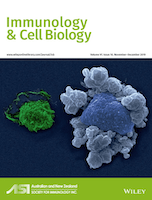
IMMUNOLOGY AND CELL BIOLOGY
Fostering Knowledge in Immunology and Cellular MechanismsIMUNOLOGY AND CELL BIOLOGY, published by Wiley, serves as a prominent platform for disseminating cutting-edge research in the fields of immunology and cell biology. With an ISSN of 0818-9641 and an E-ISSN of 1440-1711, this journal has established itself since its inception in 1987, demonstrating a commitment to advancing knowledge in its disciplines through high-quality articles. Renowned for its rigorous peer-review process, it holds a Q2 quartile ranking in both immunology and cell biology categories as of 2023, showing its competitive stature in these fields. IMUNOLOGY AND CELL BIOLOGY is indexed among the elite journals worldwide, with impressive Scopus rankings, including a rank of #75/233 in Immunology and Allergy. The journal’s comprehensive scope ensures that it caters to an audience of researchers, professionals, and students who are dedicated to exploring the intricate mechanisms of immune responses and cellular interactions. Although it does not operate under an open access model, its subscription-based content remains invaluable for those seeking to broaden their understanding of immunology and cell biology. By providing a forum for significant scientific dialogue, IMUNOLOGY AND CELL BIOLOGY continues to shape the future of research in these vital areas.

DEVELOPMENTAL AND COMPARATIVE IMMUNOLOGY
Bridging Developmental Biology and Immunology Innovations.DEVELOPMENTAL AND COMPARATIVE IMMUNOLOGY is a prominent academic journal published by Elsevier Scientific Ltd, dedicated to the exploration of immunological mechanisms across various developmental stages and species. With an ISSN of 0145-305X and an E-ISSN of 1879-0089, this journal caters to a multidisciplinary audience within the fields of Developmental Biology and Immunology. Classified in the Q3 category for both fields in 2023, it reflects a significant standing in its niche, evidenced by its Scopus rankings—with a notable 87th percentile in Agricultural and Biological Sciences and 81st percentile in Immunology and Microbiology. Spanning publications from 1977 to 2024, the journal presents peer-reviewed articles that address cutting-edge research and advancements in immunological responses throughout development. Although currently not an Open Access journal, DEVELOPMENTAL AND COMPARATIVE IMMUNOLOGY remains a vital resource for researchers, professionals, and students seeking to deepen their understanding of comparative immunology.
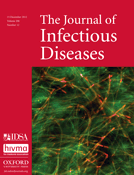
JOURNAL OF INFECTIOUS DISEASES
Leading the Charge Against Infectious DiseasesThe JOURNAL OF INFECTIOUS DISEASES, published by OXFORD UNIV PRESS INC, is a leading peer-reviewed journal dedicated to advancing the understanding of infectious diseases through high-quality research. With an impressive impact factor reflecting its prominence in the field—ranking in the Q1 category for both Immunology and Allergy and Infectious Diseases—this journal serves as a pivotal platform for researchers, healthcare professionals, and students alike. Its extensive history, spanning over a century since its inception in 1904, highlights its established authority and commitment to the field. Based in the United Kingdom, the journal covers essential topics from clinical management to epidemiological trends, providing vital insights that inform practice and policy. Although the journal is not open access, it remains accessible to a wide audience, ensuring that critical research continues to drive innovation and best practices in infectious disease management.

Immunotherapy Advances
Fostering collaboration and discovery in the world of immunology.Immunotherapy Advances, published by Oxford University Press, stands at the forefront of the rapidly evolving field of immunology and microbe interactions, focusing specifically on novel immunotherapeutic strategies and their clinical applications. Established in 2021, this peer-reviewed journal aims to disseminate high-quality research that contributes to the understanding and advancement of immunotherapeutic techniques, potentially transforming patient care in immunology. With a current Scopus rank of #140 out of 236 in the realm of Immunology, placing it in the 40th percentile, Immunotherapy Advances is positioned to be an integral resource for researchers, healthcare professionals, and students eager to stay updated with groundbreaking findings and methodologies. The journal is dedicated to fostering innovative discussions and collaborations, ensuring open access to vital research that influences treatment paradigms globally.
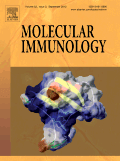
MOLECULAR IMMUNOLOGY
Transforming Understanding of Immune MechanismsMOLECULAR IMMUNOLOGY, published by Pergamon-Elsevier Science Ltd in the United Kingdom, is a highly regarded journal in the fields of Immunology and Molecular Biology. With a focus on advancing the understanding of the immune system at the molecular level, the journal has been a critical resource since its inception in 1975. The journal is currently listed in the second quartile (Q2) of its category as per the 2023 rankings, indicating its substantial impact in both Immunology and Molecular Biology research. Researchers and professionals benefit from the journal's rigorous peer-review process and its commitment to publishing high-quality original research, reviews, and methodological studies that explore the intricate dynamics of immune responses. Although it does not currently offer an open access option, MOLECULAR IMMUNOLOGY remains an essential platform for scholars, emphasizing the significance of molecular interactions within the immune system and their implications in health and disease.

Immunity Inflammation and Disease
Bridging gaps in understanding immune responses for a healthier future.Immunity, Inflammation and Disease is a premier open-access journal published by WILEY, dedicated to advancing the field of immunology and allergy. Launched in 2013, this journal has established itself as a significant platform for researchers and professionals to disseminate high-quality research findings and innovative insights that address critical issues in immune responses and inflammatory diseases. With an impact factor that reflects its growing influence and a current ranking in Q3 for Immunology and Q2 for Immunology and Allergy, this journal serves a diverse audience keen on exploring cutting-edge developments. Researchers are encouraged to submit their work to share their findings with a global reach, foster collaboration, and enhance the understanding of immune mechanisms and therapeutic strategies. Accessible since its inception, Immunity, Inflammation and Disease is committed to open science, ensuring that vital research is freely available for the advancement of knowledge within the academic community and beyond.
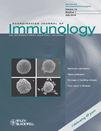
SCANDINAVIAN JOURNAL OF IMMUNOLOGY
Bridging Clinical and Basic Science in Immunological ResearchScandinavian Journal of Immunology is a prestigious peer-reviewed journal published by Wiley, focused on the evolving field of immunology and its interdisciplinary ties with medicine. Since its inception in 1972, this journal has cultivated a rich repository of knowledge, showcasing innovative research and reviews that contribute to the understanding of immune system functions, disorders, and therapeutic interventions. With an impressive impact factor reflecting a Q2 ranking in Immunology and a top-tier Q1 status in miscellaneous Medicine categories for 2023, it is recognized for its high-quality scholarly output, positioning it among the leading journals in the field. Additionally, its Scopus ranking of #84 out of 236 in Immunology underscores its significance and relevance to both emerging and established researchers. Although it does not currently offer open access options, the journal’s expansive reach and rigorous publication standards make it an essential platform for disseminating impactful research to the global scientific community. The journal invites submissions that explore the complexities of the immune system, aiming to bridge clinical and basic science for a comprehensive understanding of immunological phenomena.
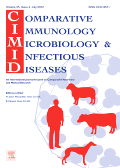
COMPARATIVE IMMUNOLOGY MICROBIOLOGY AND INFECTIOUS DISEASES
Unraveling Complexities of Immune ResponsesComparative Immunology Microbiology and Infectious Diseases, published by Elsevier Science Ltd, is a prominent journal dedicated to advancing the fields of immunology, microbiology, infectious diseases, and veterinary sciences. Established in 1978, this journal has become a vital resource for researchers and professionals alike, with a commendable impact factor that reflects its significance in academia. The journal, available in both print and electronic formats (ISSN: 0147-9571, E-ISSN: 1878-1667), stands out for its commitment to disseminating innovative research findings, particularly through its categorization in Q2 and Q3 quartiles across various related disciplines as of 2023. The journal aims to provide insightful comparative analyses that enhance our understanding of host-pathogen interactions, immune responses, and disease manifestations. With a global readership base, it serves as a platform for collaborative discourse among scientists and professionals, ultimately contributing to the improvement of health outcomes worldwide.
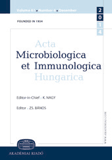
ACTA MICROBIOLOGICA ET IMMUNOLOGICA HUNGARICA
Advancing knowledge in microbiology and immunology.ACTA MICROBIOLOGICA ET IMMUNOLOGICA HUNGARICA is a distinguished academic journal published by AKADEMIAI KIADO ZRT, focusing on significant advancements in the fields of microbiology, immunology, and infectious diseases. Established in 1994, this journal serves as a vital platform for researchers, professionals, and students keen on exploring the complexities of microbial interactions and immune responses. With a current Impact Factor reflecting its rank within the Q3 categories for Immunology, Microbiology, and Infectious Diseases, it retains a critical position in disseminating innovative research. Although not open access, the journal provides extensive insights disseminated through various academic databases, ensuring a broad reach within the scholarly community. Its convergence over three decades indicates a robust commitment to excellence in scientific inquiry and knowledge sharing. As it moves towards the future, ACTA MICROBIOLOGICA ET IMMUNOLOGICA HUNGARICA continues to uphold its legacy of fostering collaborative research initiatives that contribute to the understanding and treatment of microbial diseases globally.
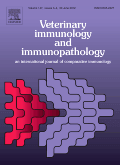
VETERINARY IMMUNOLOGY AND IMMUNOPATHOLOGY
Empowering veterinarians with cutting-edge immunological research.Veterinary Immunology and Immunopathology is a premier journal published by Elsevier, dedicated to advancing the field of veterinary science through rigorous investigations into the immunological mechanisms that underpin disease resistance, pathogenesis, and therapeutic interventions in animals. With an established history since 1979, this journal has consistently provided a platform for high-quality research, bridging the gap between immunology and veterinary medicine. The current impact factor reflects its significance within the field, particularly noted for its Q3 ranking in Immunology and Q2 in miscellaneous Veterinary categories as of 2023. The journal caters to a diverse audience, from seasoned researchers to students, by publishing original research, reviews, and case studies that explore pivotal topics such as vaccine development, immune response in various species, and the role of genetics in immunological disorders. Notably, it is indexed in Scopus, where it ranks in the top percentile of veterinary science disciplines, enhancing its visibility and impact within the scientific community. For those seeking to stay at the forefront of veterinary immunology, this journal is an invaluable resource.